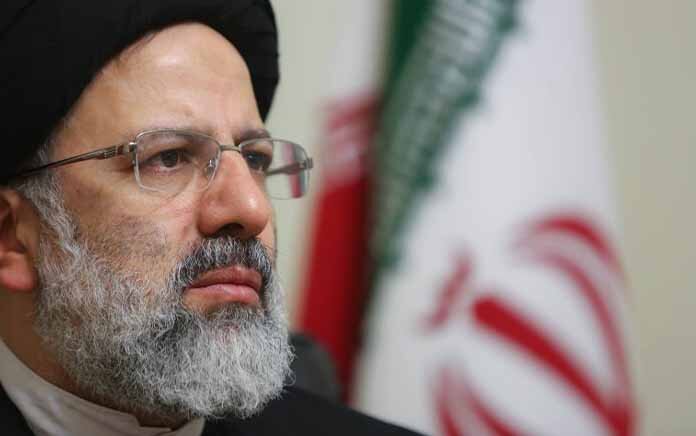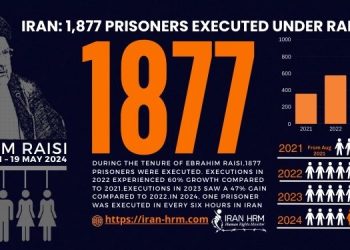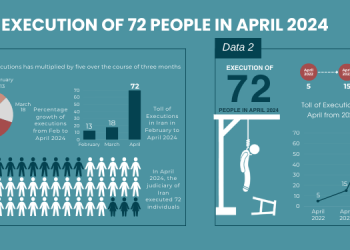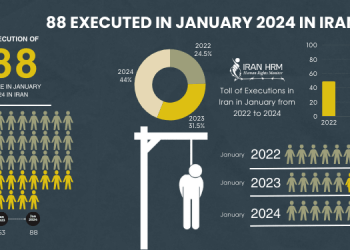Ebrahim Raisosadati, known as Ebrahim Raisi, was born in Mashhad’s district of Noghan in 1960. After completing elementary school, he went to the Cleric Institute of Mashhad. His school education is only up to the sixth grade. At the age of 15, Raisi left Mashhad to study in Qom’s seminary.
After the 1979 Revolution, Raisi, then 18, attended Qom’s Haqqani School to study the senior management of the judiciary, intelligence and security services of the clerical regime with other clerics such as Ali Fallahian, Roohollah Hosseinian, Mostafa Pourmohammadi, and others.
After the revolution, Ebrahim Raisi became one of the elements of the main core of power, the machine of repression in the newly established religious dictatorship in Iran.
In the first days of the establishment of the mullahs’ regime, Hadi Marwi, a representative of regime founder Ruhollah Khomeini in the city of Masjed Soleyman, invited Raisi to join the prosecutor’s office of mullahs’ regime, where his duty was suppressing dissidents and opposition groups.
After all the repressions in Masjed Soleyman, Raisi, while he wasn’t any more than 19 years old, was sent to the prosecutor’s office of Karaj, where his work was essentially interrogating the opponents of the Iranian regime. After a few months, Ali Ghodosi, then Attorney General, appointed Raisi as the prosecutor of Karaj after his 20th birthday.
In 1983, after months of committing atrocities and crimes in Karaj, he was also appointed as a prosecutor of Hamadan. As the cities were 340 Kilometers apart, he spent half a week in Karaj and the other half in Hamedan, until he was completely relocated to Hamedan after four months.
Raisi continued the crackdown on the opposition groups as the prosecutor in Hamedan until 1985.
After that, the 24-year old cleric was promoted to the General Prosecutor’s Office as the “associate deputy.” The Attorney General had three deputies back then: The Economic Deputy, the Deputy Director of Drug Trafficking and the so-called “Associate deputy,” whose duty was to crack down on opposition groups, including the PMOI/MEK. During the summer 1988 massacre, as a Deputy Prosecutor General, Raisi was member of “Death Committee” that put thousands of political prisoners to death.
After proving his cruelty during the massacre of 1988, Raisi earned Khomeini’s trust and was honored by him frequently.
On January 30, 1989, after considering the cruelty and devotion of Raisi, who was officially deputy of Tehran’s Revolutionary court, Khomeini promoted him to a two-member delegation along with Hossein Ali Nayeri (the judge of Shari’a), another member of the notorious Death Committee.
The task of these two was issuing sentences of execution and cutting off hands and feet for the purpose of creating suppression and
repression in the country “free of administrative obligations.”
Khomeini was not satisfied with the brutality and cruelty of the judiciary system that had just disengaged from the killing of political prisoners. While expressing surprise at the stagnation of the judicial authorities, he appointed Ebrahim Raisi and Nayeri two weeks after the above verdict was issued in order to speed up his medieval laws.
“In the name of God, the merciful and the compassionate. Since the high judicial authorities of the country have no sensitivity over the current shocking issues, Hojatoleslam Nayeri and Raisi have been appointed to take necessary actions in the framework of dear Islam, according to the above cases. It is a surprise that such events occur in the Islamic system; but the execution of God’s laws is shut down indifferently, and other judicial issues are preferable. ” 01/12/1989- Rohullah al-Musawi al-Khomeini (The same source)
Mousavi Ardebili, the head of the Supreme Judicial Council of the regime, saw his position in danger after Khomeini’s letter to Ebrahim Raisi and Nayeri. As in that letter Khomeini had said that “The high judicial authorities of the country have no sensitivity,” Ardebili decided to save his position and quickly went to Tehran’s Friday prayer and said:
“The encumbrance of the judicial system prevented the sentences from being issued and recently it was informed to [Khomeini] that this task would be extended due to these problems. He considered the problem and sent us a letter that the execution of God’s commandments should not be delayed. Once Imam had said this and we felt that we have the permission given by Imam himself, it was performed in 24 hours: Two people were executed, two hands were cut, and three people were sent to jail.
The tracking office is open all day long, and the issues can be informed by a telephone call. Just tell us that something has happened, we will quickly prepare courts using Imam’s administration. In three, four, five days, we will end the problem.” (Mousavi Ardebili – Friday prayer, January 19, 1989)
One day after the speech of Akhund Mousavi Ardebili announcing his public stand, Khomeini issued a new decree and in order to extend the authority of Raisi and Nayeri all the stagnant files in order to execute the death sentences, whipping, cutting of the hands and feet, and so on, as soon as possible.
In 2016, Khamenei appointed Raisi to run the Imam Reza charity foundation, which manages a vast conglomerate of businesses and endowments in Iran. It is one of many bonyads, or charitable foundations, fuelled by donations or assets seized after Iran’s 1979 Islamic Revolution.
These foundations offer no public accounting of their spending and answer only to Iran’s supreme leader. The Imam Reza charity, known as Astan-e Quds-e Razavi in Farsi, is believed to be one of the biggest in the country. Analysts estimate its worth at tens of billions of dollars.
On April 14, 2017 and during the elections for presidency of the regime, Raisi introduced himself as an ideal candidate for Ali Khamenei’s faction. Immediately after his candidacy was announced, because of the deliberate revelations of the Iranian Resistance, the issue of the massacre of 1988 became fresh on people’s minds and the people and the hatred towards Raisi was renewed. As it aroused a wave of disgust and hatred in the society, people made slogans against Raisi such as “killer of ‘88”.
This made him face many difficulties on his election campaign and caused him to lose the election on May 19, 2017.
On March 7, 2019, Ali Khamenei, the supreme leader of Iranian regime, appointed Ebrahim Raisi as the head of the judiciary.
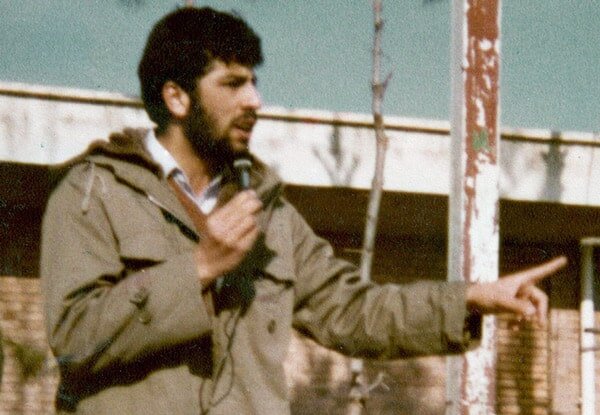
Positions:
• Assistant Prosecutor at the Karaj Revolutionary Court in 1980
• Prosecutor at the Karaj Revolutionary Court from 1980 to 1981
• Prosecutor at the Karaj and Hamedan Revolutionary Courts for four months in 1981
• Prosecutor at the Hamedan Revolutionary Court from 1982 to 1984
• Deputy Revolutionary Prosecutor in Tehran Province from 1985 to 1988
• Prosecutor in Tehran Province from 1989 to 1994
• Trustee for the Execution of Imam Khomeini’s Order (EIKO) from 1998 until present
• Chairman of the Iran General Inspection Organisation from 1994 to 2004
• First Vice Chief Justice of Iran from 2004 to August 2014
• Attorney-General of Iran from August 2014 to March 2016
• Special Clerical Court Prosecutor from May 2012 until present
• Central Council Member in the Combatant Clergy Association in Tehran Province from 1997 until present
• Member of the Assembly of Experts from South Khorasan Province from 2007 until present
• Member of the Supreme Council for Civil Personnel Selection
• Participant in the establishment of Islamic Republic Party offices in the southern region of Khorasan Province, as appointed by Seyyed Mehdi Beheshti
• Founder of Fatemeh al-Zahra Seminary for women in Tehran (Kuy-e Nasr neighbourhood)
• First Secretary of The Staff for the Revival of Enjoining Good and Forbidding Evil
• Custodian of Astan Quds Razavi from March 2016 until 2018
• Chief Justice of the Islamic Republic of Iran from 7 March 2019 until present
• Deputy Chief of the Assembly of Experts from 12 March 2019 until present
• A member of the Death Committee, responsible for the mass execution of political prisoners in 1988
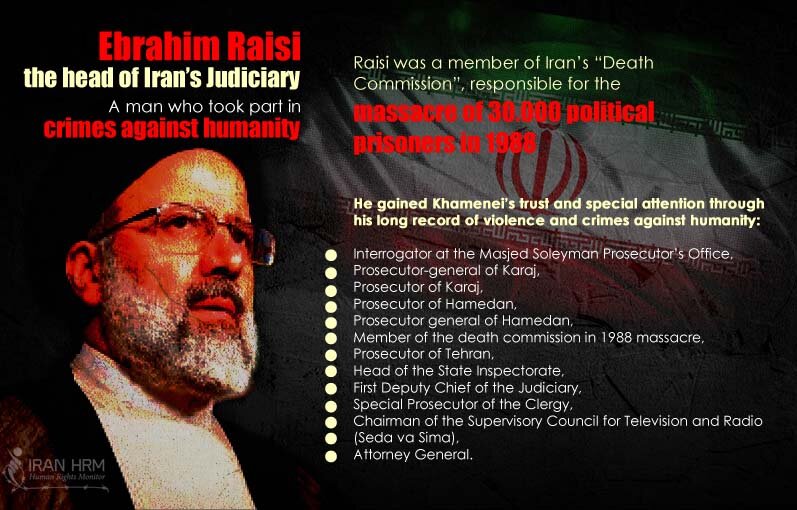
Human Rights Violations:
Ebrahim Raisi only gained Khamenei’s trust and special attention after putting behind a violent history: Interrogator at the Masjed Soleyman Prosecutor’s Office, prosecutor-general of Karaj, prosecutor of Karaj, prosecutor of Hamedan, prosecutor general of Hamedan and, after the massacre of the summer 1988,
prosecutor of Tehran, The head of the State Inspectorate, the First Deputy Chief of the Judiciary, the Special Prosecutor of the Clergy, the chairman of the Supervisory Council for Television and Radio (Seda va Sima), and the Attorney General.
• A member of the Death Committee, responsible for the mass execution of political prisoners in 1988
As Tehran Province’s Deputy Prosecutor in 1988, Seyyed Ebrahim Raisi was part of the Death Committee that decided whether prisoners would live or die, based on a few questions asked the prisoners’ political or religious beliefs.
In August and September 1988, thousands of political prisoners were executed under Ayatollah Khomeini’s fatwa (religious order), pursuant to the intelligence and judiciary authorities’ decisions. At the time of the mass executions, the victims had already served, or were currently serving, their prison sentences.
Raisi, then successor of the Attorney General of Tehran, along with Hossein Ali Nayeri (The judge of Shari’a), Morteza Eshraqi (Prosecutor of Tehran), Mostafa Pourmohammadi (Ministry of Information deputy), and Ismail Shooshtari (head of the department of Prisons) were the central decision makers of these executions, known as the “Death Committee”. The Death Committee was assigned by Khomeini to clarify the situation of those political prisoners who did not changed their opinions against the clerical dictatorship and in support of PMOI/MEK.
In his memoirs, Ayatollah Montazeri, Khomeini’s designated successor, mentions the key role played by Ebrahim Raeisi in the 1988 massacre.
The 1988 massacre of political prisoners in Iran is recognized as a crime against humanity by international human rights lawyers such as Geoffrey Robertson, as well as by the Iran Tribunal people’s court and Human Rights Watch.
The United Nations recognizes the 1988 Massacre victims’ cases as enforced disappearances. Enforced disappearance is a human rights violation and a crime under international law. The crime is not subject to statutes of limitations, and charges may be initiated at any time, until the person concerned is found or their fate is determined. According to international law, the Iranian regime should guarantee the families of victims their rights to knowing the truth about the fates and burial places of their loved ones and hold accountable those responsible for such crimes.
• Suppressing, torturing, and executing people protesting the 2009 presidential election results, and putting the opposition leaders under house arrest
As the first Vice Chief Justice of Iran, Seyyed Ebrahim Raisi was involved in suppressing, torturing, and executing people during the protests the 2009 presidential election results.
Tens of protesters were tried collectively, and some of them were condemned to death in the summer of 2009. Mohammad Reza Alizamani and Arash Rahmanipour were sentenced to death on charges of planning armed operations. After their trial, it was found they had been arrested before the election, in March and April, so they were not capable of organising post-June actions. They were both executed on 28 January 2010, nonetheless.
Though it was proved that Mohammad Reza Alizamani and Arash Rahmanipour had both been arrested before the presidential election, Raisi, in a ‘Basirat political meeting’ on 2 February 2010, told Fars News Agency: ‘Two individuals executed and nine others in the execution queue were detained in the recent riots. They were involved in anti-revolutionary movements, and their purpose was overthrowing the Islamic Republic.’
On 29 July 2009, Mehdi Karroubi, one of the opposition leaders, brought up the sexual abuse of prisoners arrested in post-election protests and called for a judicial investigation into the case.
The Iranian judiciary formed an investigative committee, comprised of Raisi (Vice Chief Justice), Gholam Hossein Eje’i (Attorney-General), and Ali Khalafi (head of the Judiciary’s office manager).
In a letter to the Chief Justice on 12 September 2009, the committee disproved sexual abuse allegations and wrote, ‘the committee rejects claims of sexual harassment to the prisoners mentioned by Mr. Karroubi. The allegations are not documented but forged and fabricated for distracting public opinion. Investigations
were conducted by the judiciary and security authorities to determine what was behind these claims. The results will be announced publicly.’
The committee’s rejection of sexual harassment claims was a consequence of the pressures put on the victims to retract their testimonies.
As Iran’s Attorney General, Seyyed Ebrahim Raisi was strict and harsh against opposition leaders and objected to lifting their house arrests. To emphasise the necessity of maintaining detention terms, on 29 December 2014 Raisi stated: ‘The Islamic Republic has been benevolent to the sedition leaders, and their detention is for ensuring their own safety.’
• Torture and Detainment of Environmentalists
As the Head of Iran’s Judiciary, Ebrahim Raisi has been responsible for continuing the detainment, torture and unfair trials of environmentalists. Since Raisi’s appointment to this position, there have been no improvements in the situation regarding their detentions, and their illegal arrests, torture and unfair trials have been ignored by him.
According to reports by human rights NGOs and testimonies from the families of the detained environmentalists, the detainees have been frequently tortured in and their indictments have been issued solely based on confessions obtained by force under torture.
Since early 2018, dozens of environmental activists have been arrested on espionage charges, without the support of evidence from the judiciary or security officials. Eight of these activists are still in prison and have been tried in closed-door trials, in the absence of their chosen legal counsels.
On 29 June 2019, the families of the eight imprisoned environmentalists wrote a letter to Ebrahim Raisi, requesting their freedom, drawing on the facts that no evidence has been revealed by the court or the IRGC’s intelligence unit regarding their alleged crimes, but for confessions ‘obtained under pressure, intimidation and torture.’ Raisi has refused to reply to this letter so far.
• Unfair Trials for Journalists and Violating Freedom of Speech
As the Head of Iran’s Judiciary, Ebrahim Raisi has been responsible for violating the freedom of speech by threatening journalists, and for their arrests and unfair trials.
On 22 May 2019, Raisi said in a discussion with journalists and media directors:
‘The media must be careful as to not publish and reveal words and signals that would make the enemy happy’.
Raisi threatened journalists in the same discussion, saying they will be taken to the court if they cross the ‘red lines’ of the Islamic Republic.
Since Raisi became Head of Iran’s Judiciary, at least four journalists, Marziyeh Amiri, Keyvan Samimi, Masoud Kazemi and Mohammadreza Nasab-Abdollahi have been arrested and tried unfairly for baseless charges, without right to defend themselves in revolutionary court trials.

